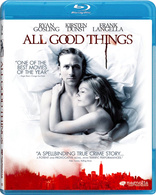All Good Things Blu-ray Movie
HomeAll Good Things Blu-ray Movie 
Magnolia Pictures | 2010 | 101 min | Rated R | Mar 29, 2011Movie rating
6.5 | / 10 |
Blu-ray rating
| Users | 3.0 | |
| Reviewer | 3.5 | |
| Overall | 3.2 |
Overview
All Good Things (2010)
A love story and murder mystery set against the backdrop of a New York real estate dynasty in the 1980s, inspired by the most notorious missing person's case in New York history. Robert Durst, scion of the wealthy Durst family, was suspected but never tried for killing his wife Kathie who disappeared in 1982 and was never found.
Starring: Ryan Gosling, Kirsten Dunst, Frank Langella, Lily Rabe, Philip Baker HallDirector: Andrew Jarecki
| Romance | Uncertain |
| Psychological thriller | Uncertain |
| Thriller | Uncertain |
| Drama | Uncertain |
| Crime | Uncertain |
| Mystery | Uncertain |
Specifications
Video
Video codec: MPEG-4 AVC
Video resolution: 1080p
Aspect ratio: 1.78:1
Original aspect ratio: 1.85:1
Audio
English: DTS-HD Master Audio 5.1
Subtitles
English SDH, Spanish
Discs
50GB Blu-ray Disc
Single disc (1 BD)
Playback
Region A (locked)
Review
Rating summary
| Movie | 3.5 | |
| Video | 4.0 | |
| Audio | 4.0 | |
| Extras | 3.5 | |
| Overall | 3.5 |
All Good Things Blu-ray Movie Review
Unsolved and cold-blooded...
Reviewed by Casey Broadwater March 26, 2011Forget development hell. All Good Things, despite being finished in 2008, was stuck in delayed release limbo until last December. The movie was originally a Weinstein Company production, but the former Miramax bros’ financial woes and hand-wringing prompted director Andrew Jarecki—of Capturing the Friedmans fame—to buy back the distribution rights himself and sell them to Magnolia Pictures, who finally gave the film a limited theatrical release. All this changing of hands did little to help the film at the box office; with a $20 million budget, All Good Things pulled in only $450,000 in ticket sales. It deserves better. While it’s not a great film, it is a fairly compelling true-crime drama about one of the most bizarre cases in New York history. (And, let’s face it—there have been a lot of bizarre cases in New York.) In 2003, Robert Durst, the son of an N.Y.C. real estate tycoon, was put on trial for the murder and dismemberment of his friend Morris Black. Durst got off on claims of self-defense, but there’s much more to the story, including the still-unsolved murder of another of Durst’s friends, Susan Berman, and the conspicuous 1982 disappearance of his wife, Kathleen McKormack, who has never been found.
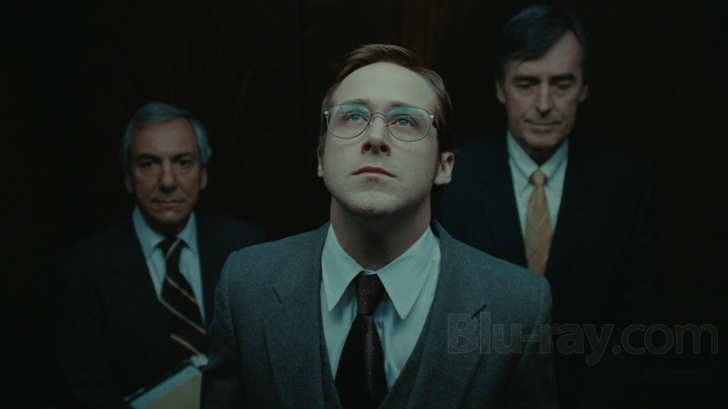
Not fit for business...
For legal reasons, presumably, all the names have been changed in the film, which opens in 1971, when Durst—now called “David Marks” and played by Ryan Gosling—meets his soon-to-be wife, “Katie McCarthy” (Kirsten Dunst). They’re from different worlds. Katie has happy lower-middle- class roots, while David hails from one of the richest—and most dysfunctional—dynasties in New York. His father, Sanford Marks (Frank Langella), owns half of Times Square—then the seedy province of strip clubs, peep shows, and massage parlors—and like most wealthy men of business, he hopes his son will follow in his outsized footsteps. David, however, lacks his father’s money-hungry bent and bigwig-schmoozing charisma. He’s squirrelly and shy, awkward at parties and generally unfit for the cutthroat real estate game. (Later, Robert Durst was diagnosed with Asperger’s syndrome, a fact that only makes it into the film through insinuation.) David and Katie marry, and briefly find happiness running a health food store in rural Vermont—called “All Good Things”—but their relationship begins to deteriorate when Sanford lures David reluctantly back into the family trade. This is essentially a story about a man who is unable to do what he wants, and who becomes what he’s always despised—his father. The psychological strain and discontent give way to violence and, eventually, a strange transformation that’s almost beyond belief.
Covering the span between 1971 and 2000, All Good Things posits possible answers to the three mysteries that cast a large shadow over Robert Durst’s past. The first half of the film focuses on David’s sweet-turned-sour relationship with Katie, and director Andrew Jarecki effectively compresses a decade of marriage into forty-five minutes. We see David’s fears of fatherhood—he forces his wife to get an abortion—and witness his mounting internal rage as Katie grows distant, focused alternately on her med school classes and partying with her cocaine-toting disco chick friend, Lauren Fleck (Kristen Wiig, proving once again that she’s more than just a comedienne). Jerecki handles Katie’s disappearance with initially frustrating ambiguity, but he does ominously imply that David is indeed to blame. From here, the film—and the real-life story—takes a bizarre tangent. Overwhelmed with the media storm over his missing wife, David covertly moves to Galveston, Texas, where—no kidding—he begins crossdressing, passing himself off as a mute woman. It’s here that he develops a strange friendship with Malvern Bump (Philip Baker Hall)—standing in for the real Morris Black—a WWII vet who lives in the apartment next door. Without spoiling the details, I’ll leave it at this: Jerecki implicates Malvern in the execution-style death of “Deborah Lerhman” (Lily Rabe), David’s longtime confidante, and then suggests that David’s subsequent killing and gruesome dismemberment of Malvern was only partially motivated by self-defense.
We may never know what really took place, but Jemecki’s fill-in-the-blanks reconstruction of the events is certainly plausible, not to mention satisfying from a dramatic perspective. Screenwriters Marcus Hinchey and Marc Smerling structure the plot in a series of flashbacks, told from David’s perspective as he gives his life story on the witness stand during his 2003 trial. These flashes are periodically broken up by non-linear inserts, like 16mm home movie footage from David’s troubled childhood, and mysterious shots of a woman dumping garbage bags in a river. Much of it works. However, the director’s first attempt at non-documentary filmmaking sometimes seems a little too melodramatic for its own good. Much of this has to do with Rob Simonsen’s score, which never ceases with the piercing, Hitchcockian violin stabs. (We get it—danger!) That said, when the music subsides we’re treated to tightly written, psychologically complex relationships, and fine performances from an all-star cast. Kirsten Dunst does subtle, powerful work as a wife slowly realizing that her husband isn’t who she thought he was. Old-timers Frank Langella and Philip Baker Hall give dimensionality to roles that could’ve easily been played flat. And while his mutation into a cross-dressing, vampiric-looking mute who sports caked white makeup and silky 1960s blouses is unintentionally comic, Ryan Gosling is frighteningly good as David Marks—tender, then tormented, and eventually terrifying.
All Good Things Blu-ray Movie, Video Quality 
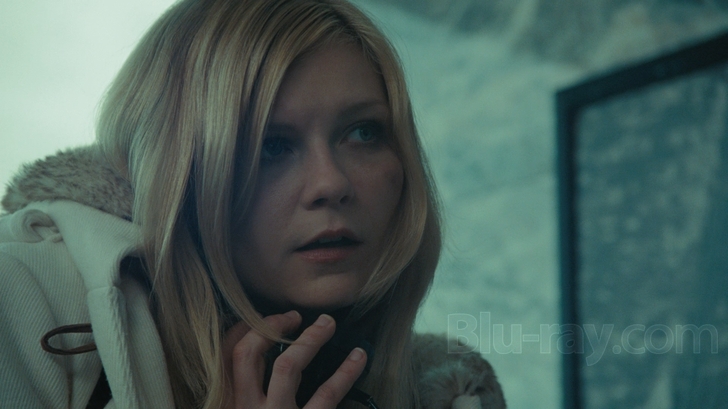
All Good Things arrives on Blu-ray, courtesy of Magnolia Home Entertainment, with a 1080p/AVC encode on a dual-layer 50 GB disc. In general, this is a very strong high definition transfer with a natural filmic appearance and a fine grain structure. (No DNR or excessive edge enhancement here.) The film's look is defined by a chilly bluish cast that pervades most scenes, setting an appropriately bleak mood. This leaves skin tones looking a bit pallid, but this is intentional. Even in the frostiest scenes, color is still strong and well-saturated, although black levels typically hover around a deep grey. The image tends to be crisply resolved, with detail easily visible where you most often look for it—in the textures of the actors' faces, the stitching of their clothing, important props, etc. The encode is solid as well. I didn't spot any noticeable compression problems—no banding, macroblocking, or errant artifacts. This might not be the most eye-catching transfer of the year—it's icy, ominous, and dark—but it does seem accurate and free of any nitpicky video concerns.
All Good Things Blu-ray Movie, Audio Quality 
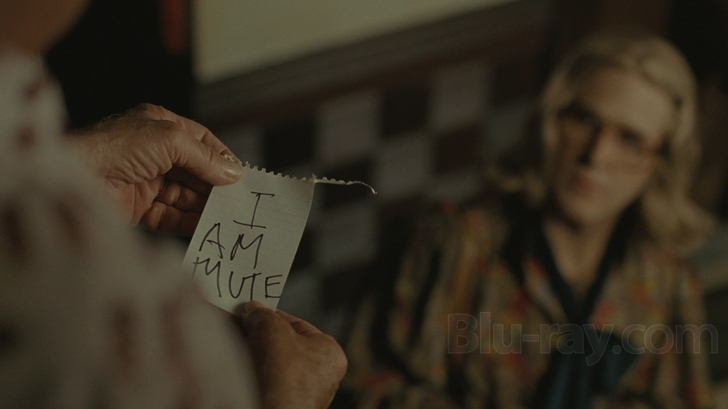
As usual, Magnolia has supplied this disc with a lossless DTS-HD Master Audio 5.1 surround track, and the results—like the video transfer—are certainly strong, even if the mix isn't necessarily showy or bombastic. This is a menacing but low-key thriller and it has a soundtrack to match, heavy on portentous ambience and a score dominated by stabbing violins straight out of Psycho. The rear channels are used frequently to add to the mood; bird calls and wind and other outdoorsy sounds blow through surround speakers, a fluorescent hum buzzes in a tile bathroom, rain pours in wet heavy drops, and thunder claps spookily. There are even a few seamless cross-channel effects, like a car roaring from left to right. Rob Simonsen's score really is too much—it booms and screeches melodramatically—but it at least sounds good, full and forceful, with plenty of low-end anchorage. The timbre of the strings sounds particularly and impressively clear. There are a few moments when dialogue seems a hair low in the mix, but the voices are clean, unmuffled, and generally easy to understand. The disc includes English SDH and Spanish subtitles.
All Good Things Blu-ray Movie, Special Features and Extras 
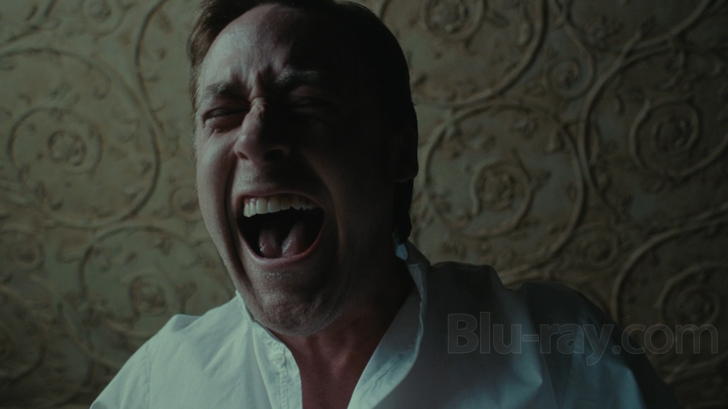
- Commentary with Andrew Jarecki and Robert Durst: Yes, you read that right. The real Robert Durst joins the director for an audio commentary. I can't say that Durst drops any major revelations during the feature-length talk, but it's interesting to hear his side of the story. Jarecki basically serves as moderator, asking probing questions throughout.
- Commentary with Andrew Jarecki, Marcus Hinchey, and Marc Smerling: If I was only going to listen to one track, it would be the one with Robert Durst, but this a great commentary as well—if more normal—featuring the director and his two screenwriters dissecting the intricacies of the story.
- Deleted Scenes (SD, 5:22): Includes four short deleted scenes.
- All Good Things: Truth in Fiction (SD, 26:07): A good making-of documentary, featuring interviews with the film's director, screenwriters, producer, and stars, who all discuss their approach to the real-life story.
- Back in Time: Researching the Original Story (1080i, 22:48): Andrew Jarecki conducted hundreds of hours of interviews with people connected to the Robert Durst case—family members, friends, business associates, etc.—and here we get a 20-minute compression. In some ways, this featurette is more enlightening than the film.
- Wrinkles in Time: Ryan Ages (720p, 1:45): Time-lapse footage of Ryan Gosling having his old man make-up applied.
- Beneath the Surface of All Good Things: Interview with Andrew Jarecki (1080i, 58:22): If you've sat through the two commentaries, the making-of documentary, and the interviews with those involved, this extensive sit-down with Jarecki may seem like overkill, but it's one of the best features on the disc, exhaustive and informative, not only about the details of the case but also about Jarecki's filmmaking process.
- Also From Magnolia Home Entertainment Blu-ray: A collection of trailers for upcoming Magnolia release, plus a promo for HDNet.
All Good Things Blu-ray Movie, Overall Score and Recommendation 
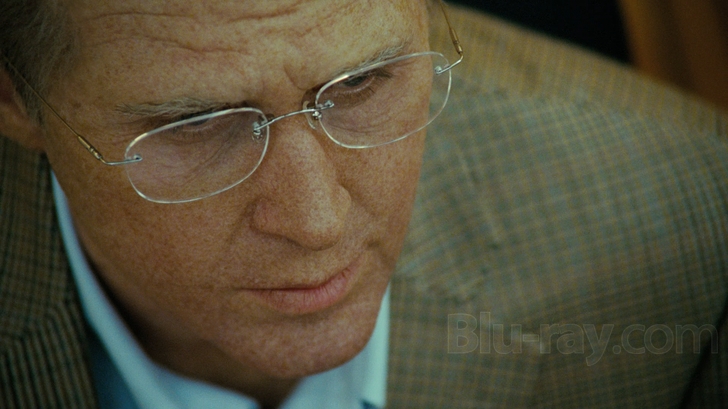
True-crime fans will definitely want to check out All Good Things, which has all the essentials—a screwed up family, grisly murders, an enigmatic main character, and a dark, still-unsolved mystery. The film did bad business in theaters, but hopefully it'll find its audience on Blu-ray, where it looks great, sounds great, and offers several hours of insightful bonus materials.
Similar titles
Similar titles you might also like

Spellbound
1945

Vertigo 4K
1958

Dead Again
1991

Rope 4K
1948

Rear Window 4K
1954

Rebecca
1940

Safe Haven
2013

Gone Girl
2014

Match Point
2005

Beast
2017

Snow Falling on Cedars
Collector's Edition
1999

In a Lonely Place
1950

Frank & Lola
2016

The Girl on the Train 4K
2016

Never Talk to Strangers
1995

The United States of Leland
2003

Lonely Hearts
2006

Love Lies Bleeding 4K
2024

American Gigolo 4K
Standard Edition
1980

Kiss the Girls
1997
